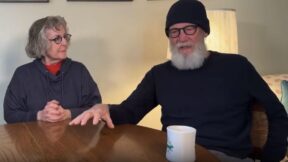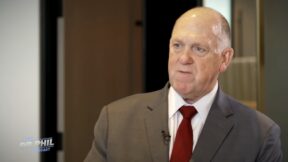CNN’s Kaitlan Collins Calls Trump Out After Confronting Him to His Face About $230 Mil Demand
CNN anchor Kaitlan Collins called out the “layers of conflict” hours after confronting President Donald Trump to his face about his plans to seek a $20 million payoff from his own Justice Department.
Trump took questions at a Diwali event Tuesday evening, during which reporters, including Collins, confronted him over the New York Times report about the settlement. Trump confirmed to Collins that the settlement is being sought, but claimed not to know the amount.
On Tuesday night’s edition of CNN’s The Source with Kaitlan Collins, Collins opened her show by playing that confrontation and calling out the conflict of having his own former attorneys now empowered to influence the settlement as senior Justice officials:
KAITLAN COLLINS: Tonight, President Trump confirms to me that he is planning to essentially, potentially pay himself a major settlement from the Department of Justice that would be paid for, presumably, by the American taxpayers.
The New York Times broke this story just before we went into the Oval Office today, reporting that Trump is seeking some $230 million in compensation from the Justice Department for previous federal investigations into him.
(BEGIN VIDEO CLIP)
COLLINS: The New York Times is reporting that your legal team is seeking $230 million from your own Justice Department now, in response to the investigations into you. Is–
PRESIDENT DONALD TRUMP: It could be, yes.
COLLINS: Is that something you want your legal team to do?
TRUMP: I don’t know what the numbers are. I don’t even talk to them about it. All I know is that they would owe me a lot of money, but I don’t — I’m not looking for money. I’d give it to charity or something. I would give it to charity, any money.
But look, what they did, they rigged the election. And as you know, we had, in one case, 60 Minutes had to pay us a lot of money, George Slopadopalis had to pay us a lot of money, and they already paid, you know, they paid me a lot of money, because what they did was wrong. And you know, when somebody does what’s wrong.
Now, with the country, it’s interesting, because I’m the one that makes a decision, right? And you know, that decision would have to go across my desk. And it’s awfully strange to make a decision where I’m paying myself.
In other words, did you ever have one of those cases where you have to decide how much you’re paying yourself in damages?
But I was damaged very greatly, and any money that I would get I would give to charity.
(END VIDEO CLIP)
COLLINS: The President, of course, had these complaints filed, according to The Times, when he was out of office. But he is now in office. So the people who would decide whether or not the President gets the money that his legal team said they were seeking from the just Justice Department, are now his own appointees. And they include his former personal attorney who defended the President in one of the cases that he is referencing here.
The New York Times posted Trump’s claim regarding the classified documents case. In it, the President is demanding $100 million from the Justice Department. We’ve yet to see the other claim, but it is reportedly worth a $130 million, and is tied to the Russia investigation.
Just to put what the President is demanding here, in perspective for you. One example from just last month is where a man who spent 38 years in prison, for a crime that he did not commit got $25 million. The layers of potential conflicts here do extend beyond the Oval Office, where the President was taking our questions on this today. The decision on whether to approve any settlement over $4 million typically is made by a pair of top Justice Department officials. One of them is the head of the Justice Department’s Civil Division and — Civil Division, and that person represented the President and his co- defendants in the classified documents case. The other is the President’s former personal attorney, and now his Deputy Attorney General, Todd Blanche.
Todd Blanche was actually questioned, during his Senate confirmation hearing, about what he would do, if this issue, his former representation of the President, came into conflict with his new job.
(BEGIN VIDEO CLIP)
SEN. ADAM SCHIFF (D-CA): Let me just ask you. You have not been confirmed yet. Are you still Donald Trump’s lawyer?
TODD BLANCHE, UNITED STATES DEPUTY ATTORNEY GENERAL: I mean, yes, my attorney-client relationship with President Trump remains. Yes.
What I’m — what I’m not acknowledging is the broad strokes you’re giving it. That work, for example. There will be conflicts. And I will not violate my ethical obligations.
I will follow the rules as told to me by the experts, career prosecutors in the department.
SCHIFF: If you are given the discretion of overseeing cases in which you are his lawyer, will you recuse yourself?
BLANCHE: It depends.
(END VIDEO CLIP)
COLLINS: Just a few months after that testimony, you heard from there, Attorney General Pam Bondi fired the top ethics official at the Justice Department.
And as The New York Times was reporting out this story, they spoke to an ethics professor about how this would play out, where the President and his own officials would technically be in charge of deciding whether or not he would get a settlement from the Justice Department that he is seeking. And this person told The Times, quote, “The ethical conflict is just so basic and fundamental, you don’t need a law professor to explain it.”
Watch above via CNN’s The Source with Kaitlan Collins.





Comments
↓ Scroll down for comments ↓